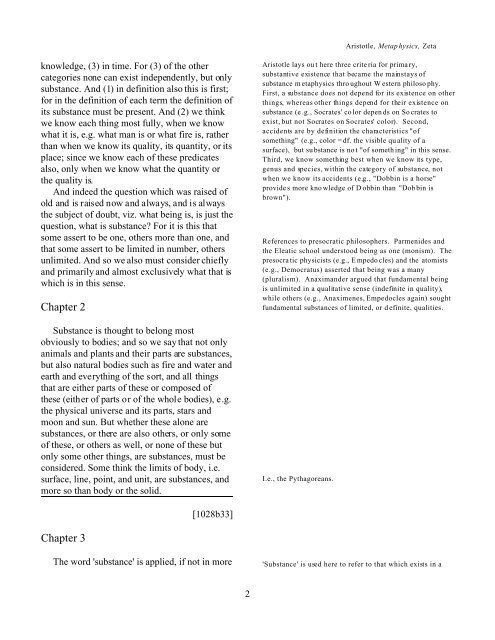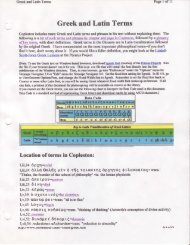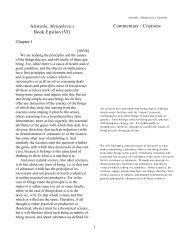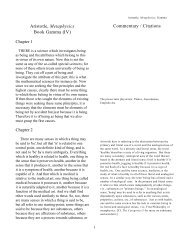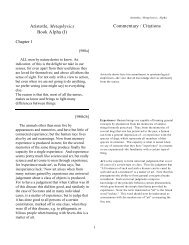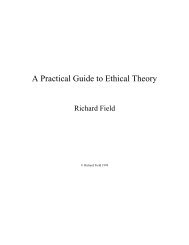Aristotle, Metaphysics Book Zeta (VII) Commentary ... - CATpages
Aristotle, Metaphysics Book Zeta (VII) Commentary ... - CATpages
Aristotle, Metaphysics Book Zeta (VII) Commentary ... - CATpages
You also want an ePaper? Increase the reach of your titles
YUMPU automatically turns print PDFs into web optimized ePapers that Google loves.
<strong>Aristotle</strong>, <strong>Metaphysics</strong>, <strong>Zeta</strong><br />
knowledge, (3) in time. For (3) of the other<br />
categories none can exist independently, but only<br />
substance. And (1) in definition also this is first;<br />
for in the definition of each term the definition of<br />
its substance must be present. And (2) we think<br />
we know each thing most fully, when we know<br />
what it is, e.g. what man is or what fire is, rather<br />
than when we know its quality, its quantity, or its<br />
place; since we know each of these predicates<br />
also, only when we know what the quantity or<br />
the quality is.<br />
And indeed the question which was raised of<br />
old and is raised now and always, and is always<br />
the subject of doubt, viz. what being is, is just the<br />
question, what is substance? For it is this that<br />
some assert to be one, others more than one, and<br />
that some assert to be limited in number, others<br />
unlimited. And so we also must consider chiefly<br />
and primarily and almost exclusively what that is<br />
which is in this sense.<br />
Chapter 2<br />
Substance is thought to belong most<br />
obviously to bodies; and so we say that not only<br />
animals and plants and their parts are substances,<br />
but also natural bodies such as fire and water and<br />
earth and everything of the sort, and all things<br />
that are either parts of these or composed of<br />
these (either of parts or of the whole bodies), e.g.<br />
the physical universe and its parts, stars and<br />
moon and sun. But whether these alone are<br />
substances, or there are also others, or only some<br />
of these, or others as well, or none of these but<br />
only some other things, are substances, must be<br />
considered. Some think the limits of body, i.e.<br />
surface, line, point, and unit, are substances, and<br />
more so than body or the solid.<br />
<strong>Aristotle</strong> lays out here three criteria for primary,<br />
substantive existence that became the mainstays of<br />
substance m etaphysics thro ughout W estern philoso phy.<br />
First, a substance does not depend for its existence on other<br />
things, whereas other things depend for their existence on<br />
substance (e.g., Socrates' color depends on Socrates to<br />
exist, but not Socrates on Socrates' color). Second,<br />
accidents are by definition the characteristics "of<br />
something" (e.g., color =df. the visible quality of a<br />
surface), but substance is not "of something" in this sense.<br />
Third, we know something best when we know its type,<br />
genus and species, within the category of substance, not<br />
when we know its accidents (e.g., "Dobbin is a horse"<br />
provides more kno wledge of D obbin than "Dobbin is<br />
brown").<br />
References to presocratic philosophers. Parmenides and<br />
the Eleatic school understood being as one (monism). The<br />
presocratic physicists (e.g., Empedocles) and the atomists<br />
(e.g., Democratus) asserted that being was a many<br />
(pluralism). Anaximander argued that fundamental being<br />
is unlimited in a qualitative sense (indefinite in quality),<br />
while others (e.g., Anaximenes, Empedocles again) sought<br />
fundamental substances of limited, or definite, qualities.<br />
I.e., the Pythagoreans.<br />
[1028b33]<br />
Chapter 3<br />
The word 'substance' is applied, if not in more<br />
'Substance' is used here to refer to that which exists in a<br />
2


